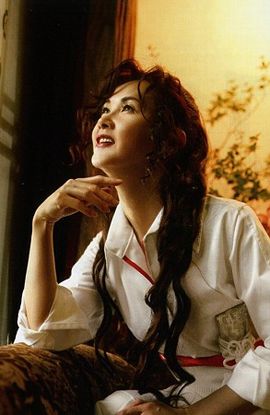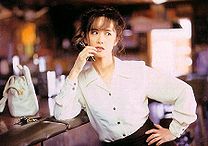You can now "Thank" others for their contributions, set up email and two-factor authentication, and more!
Nakajima Miyuki: Difference between revisions
m (→Studio Albums) |
m (→Studio Albums) |
||
| Line 76: | Line 76: | ||
*[2004.11.17] [[Ima no Kimochi]] (いまのきもち) | *[2004.11.17] [[Ima no Kimochi]] (いまのきもち) | ||
*[2005.11.16] [[Ten-Sei|TEN-SEI]] (転生 TEN-SEI) | *[2005.11.16] [[Ten-Sei|TEN-SEI]] (転生 TEN-SEI) | ||
*[ | *[2006.11.22] [[Lullaby Singer (Nakajima Miyuki album)|Lullaby SINGER]] (ララバイSINGER) | ||
*[2007.10.03] [[I Love You, Kotaetekure (Nakajima Miyuki album)|I Love You, Kotaetekure]] (I Love You, 答えてくれ) | *[2007.10.03] [[I Love You, Kotaetekure (Nakajima Miyuki album)|I Love You, Kotaetekure]] (I Love You, 答えてくれ) | ||
Revision as of 04:42, 17 July 2009

Nakajima Miyuki (中島みゆき) is a Japanese folk singer-songwriter who debuted in 1975. During her career, she has released 35 studio albums and 40 singles. Among them, 5 singles and 10 albums had reached #1 on the Oricon charts. Her single "Chijou no Hoshi / Headlight, Taillight" released in 2000 is the second longest charting release according to Oricon with 202 weeks in the top 200. Aside from singing, Nakajima is also known for writing numerous songs for other artists, notably Kudo Shizuka.
Nakajima is also the only singer who participated in the National Language Council of Japan in 1990s.
Profile
- Stage Name: Nakajima Miyuki (中島みゆき)
- Real Name: Nakajima Miyuki (中島美雪)
- Birthday: February 23rd, 1952
- Birth Place: Sapporo, Hokkaido, Japan
Biography
Early Career - Rise to Fame
Nakajima Miyuki was born in 1952 in Sapporo city of Hokkaido. When she was 5 year-old, her family moved from Sapporo to Iwanai, where they lived for 6 years. She lived in Obihiro during her teenage time and attended to Obihiro Hakuyou High School. After her high school graduation, Nakajima went back to Sapporo city and enrolled Fuji Women's University. During her university time, Nakajima attended to a folk song contest held in Hibiya, Tokyo and won the prize with the song "Atashi Tokidoki Omouno". In 1974, she graduated from the university.
In May 1975, she won the ninth Popular Song Contest organized by Yamaha Music Foundation, which leaded her to a contract with Pony Canyon label. In September of the same year, Nakajima Miyuki won the the sixth World Popular Song Festival and made her major debut with the single "Azami Jou no Lullaby". She released her debut album "Watashi no Koe ga Kikoemasuka" in April 1976. Her fifth single, "Wakareuta" released in 1977 was her breakthrough in the music scene by reaching #1 on the Oricon charts. Follow the success of "Wakareuta", her fourth album "Aishiteiru to Ittekure" also reached #2 on the Oricon charts and her fifth album, "Shin'ai Naru Mono e" topped the charts, being Nakajima's first studio album to hit #1 on Oricon charts. Even though Nakajima has a successful career in 1970s and 1980s, her songs always expressed sad and hateful lyrics toward love.
Aside from her musical career, Nakajima also worked as a radio personality but she refused to appear on TV like other folk artists at that time.
1980s-1990s
In 1980-1990s, Nakajima continued to release albums every year and has 7 consecutive number one albums from 1980 to 1985, including "Ikiteitemo Ii Desu ka", "Ringetsu", "Kansuigyo", "Yokan", "Hajimemashite", "Oiro Naoshi" and "miss M.". In 1988, Nakajima launched her Yakai musical project, a jukebox stage performance featuring songs composed by her. The performances took place at the Bunkamura Theatre Cocoon, Shibuya, Tokyo every December for 10 years, from 1988 to 1998.
During 1980s, she also started to write more songs for other artists, notably her song "Haru na no ni" for idol singer Kashiwabara Yoshie, which won the 25th Japan Record Award in 1983. In 1987, she collaborated with Goto Tsugutoshi and wrote music for singer Kudo Shizuka, a former member of idol group Onyanko Club. Even though her partnership with Goto ended in 1993, Nakajima still continued to write several songs for Kudo. Nakajima also self-covered most of her songs composed for other artists in her studio albums.
In 1990s, even though her popularity has declined by years, Nakajima still has a special place in the music scene. Her single "Asai Nemuri" in 1992 which was used as the theme song for the drama Shin'ai Naru Mono e reached #2 on the Oricon charts, selling over one million copies. In 1994, another drama theme song of hers, "Sora to Kimi no Aida ni" topped the charts and sold over 1,4 million copies. Her 22nd studio album, "LOVE OR NOTHING" released on the same year is her last album to reached #1 on the Oricon charts.
During 1990s, her song lyrics were brighter than 1970-1980s and have more literary and educational elements. Nakajima is the only singer who participated in the National Language Council of Japan in late 1990s.
2000s
Editing Nakajima Miyuki - Jpop Stop! By the end of 1990s, Nakajima left Pony Canyon label and signed with Yamaha Music Communications. In the year 2000, her single "Chijou no Hoshi / Headlight, Taillight" reached #1 on the Oricon weekly charts and stayed for 202 weeks in the top 200. It is known as the second longest charting release in Japan according to Oricon (behind Natsukawa Rimi's "Nada Sousou"). Nakajima also made her first live performance on TV since 1970s by appearing at NHK Kouhaku Uta Gassen of 2002.
In 2006, she wrote the song "Sorafune" for TOKIO which was used as the theme for the drama My Boss, My Hero starring Nagase Tomoya. The single reached #1 on the Oricon charts and charted for 62 weeks, selling 483,545 copies. Nakajima also self-covered the song in her 2005 album "Lullaby SINGER". Her lastest studio album "I Love You, Kotaetekure" was also leaded by the self-cover of another song written for TOKIO. The album reached #4 on the Oricon charts, marking Nakajima's 34th release to enter Oricon top 10 weekly.
Trivia
- Nakajima Miyuki had wrote over 90 songs for numerous singers. Among them, "FU-JIT-SU", "MUGO n Iroppoi", "Kousa ni Fukarete", "Watashi ni Tsuite", "Doukoku" by Kudo Shizuka and "Sorafune / do! do! do!" by TOKIO had topped the Oricon weekly charts.
- She is also the Japanese songwriters who has the most cover versions performed by Japanese and non-Japanese artists, especially in Taiwan and Hong Kong.
- In 1992, Faye Wong covered her song "Rouge" with the title "Jung Ji Sau Soeng Dik Neoi Yan (容易受傷的女人; Fragile Woman)" in her "Coming Home" album. The song became a big hit in Hong Kong, received several musical awards and helped rising her Wong's career to stardom. Wong's version also were covered by various Chinese and East-Asian artists.
Discography
Studio Albums
- [1976.04.25] Watashi no Koe ga Kikoemasuka (私の声が聞こえますか)
- [1976.10.25] Minna Itte Shimatta (みんな去ってしまった)
- [1977.06.25] A・ri・ga・to・u (あ・り・が・と・う)
- [1978.04.10] Aishiteiru to Ittekure (愛していると云ってくれ)
- [1979.03.21] Shin'ai Naru Mono e (親愛なる者へ)
- [1979.11.21] Okaerinasai (おかえりなさい)
- [1980.04.05] Ikiteitemo Ii Desu ka (生きていてもいいですか)
- [1981.03.05] Ringetsu (臨月)
- [1982.03.21] Kansuigyo (寒水魚)
- [1983.05.05] Yokan (予感)
- [1984.10.24] Hajimemashite (はじめまして)
- [1985.04.17] Oiro Naoshi (御色なおし)
- [1985.11.07] miss M.
- [1986.11.21] 36.5°C
- [1988.03.16] Nakajima Miyuki (中島みゆき)
- [1988.11.16] Goodbye Girl (グッバイ ガール)
- [1989.11.15] Kaikinetsu (回帰熱)
- [1990.06.13] Yoru wo Yuke (夜を往け)
- [1991.10.23] Utadeshika Ienai (歌でしか言えない)
- [1992.10.07] EAST ASIA
- [1993.10.21] Jidai -Time goes around- (時代 -Time goes around-)
- [1994.10.21] LOVE OR NOTHING
- [1995.10.20] 10 WINGS
- [1996.10.18] Paradise Cafe (パラダイス・カフェ)
- [1998.03.18] Watashi no Kodomo ni Narinasai (わたしの子供になりなさい)
- [1999.11.03] Hi-WINGS (日-WINGS)
- [1999.11.03] Tsuki-WINGS (月-WINGS)
- [2000.11.15] Tanpenshuu (短篇集)
- [2001.09.19] Kokoro Moriuta (心守歌)
- [2002.10.23] Otogibanashi -Fairy Ring- (おとぎばなし -Fairy Ring-)
- [2003.11.19] Koibumi (恋文)
- [2004.11.17] Ima no Kimochi (いまのきもち)
- [2005.11.16] TEN-SEI (転生 TEN-SEI)
- [2006.11.22] Lullaby SINGER (ララバイSINGER)
- [2007.10.03] I Love You, Kotaetekure (I Love You, 答えてくれ)
Best Albums
- [1986.01.05] Nakajima Miyuki THE BEST (中島みゆき THE BEST)
- [1987.08.21] Singles
- [1989.03.21] Nakajima Miyuki PRESENTS BEST SELECTION 16 (中島みゆき PRESENTS BEST SELECTION 16)
- [1992.04.01] Nakajima Miyuki BEST SELECTION II (中島みゆき BEST SELECTION II)
- [1994.04.21] Singles II
- [1996.03.21] Daiginjou (大吟醸)
- [1998.11.06] Daiginmaku (大銀幕)
- [2002.04.17] Singles 2000
- [2006.06.14] Genki Desu ka (元気ですか)
Live Alums
- [1987.02.21] Utagoyomi (歌暦)
- [2005.03.23] Nakajima Miyuki Live! Live at Sony Pictures Studios in L.A. (中島みゆきライヴ! Live at Sony Pictures Studios in L.A.)
- [2008.06.11] Utatabi -Nakajima Miyuki Concert Tour 2007- (歌旅 -中島みゆきコンサートツアー2007-)
Singles
- [1975.09.25] Azami Jou no Lullaby (アザミ嬢のララバイ)
- [1975.12.21] Jidai (時代)
- [1976.03.25] Konbanwa (こんばんわ)
- [1976.07.25] Yokaze no Naka Kara (夜風の中から)
- [1977.09.10] Wakareuta (わかれうた)
- [1978.08.21] Omoide Gawa (おもいで河)
- [1979.09.21] Revival (りばいばる)
- [1980.02.05] Kanashimi Warai (かなしみ笑い)
- [1980.10.21] Hitori Jouzu (ひとり上手)
- [1981.03.21] Ashita Tenki ni Nare (あした天気になれ)
- [1981.10.21] Akujo (悪女)
- [1982.04.05] Yuuwaku (誘惑)
- [1982.09.21] Yokorenbo (横恋慕)
- [1983.10.21] Ano Ko (あの娘)
- [1984.03.21] Hitori (ひとり)
- [1985.09.18] Kodoku no Shouzou (孤独の肖像)
- [1985.12.21] Tsumetai Wakare (つめたい別れ)
- [1986.06.05] Atai no Natsuyasumi (あたいの夏休み)
- [1986.09.21] Mikaeri Bijin (見返り美人)
- [1986.11.21] Yamaneko (やまねこ)
- [1987.10.05] Gokigen Ikaga (御機嫌如何)
- [1988.02.26] Kamen (仮面)
- [1988.10.21] Namida -Made in tears- (涙 -Made in tears-)
- [1989.03.21] Ashita (あした)
- [1990.08.21] with
- [1991.06.05] Tokyo Maigo (トーキョー迷子)
- [1992.03.04] Tanjou / Maybe (誕生 / Maybe)
- [1992.07.29] Asai Nemuri (浅い眠り)
- [1993.04.21] Jealousy Jealousy (ジェラシー・ジェラシー)
- [1993.12.01] Jidai / Saigo no Megami (時代 / 最後の女神)
- [1994.05.14] Sora to Kimi no Aida ni / Fight! (空と君のあいだに / ファイト!)
- [1995.05.19] Tabibito no Uta (旅人のうた)
- [1996.11.21] Takaga Ai (たかが愛)
- [1997.11.07] Aijou Monogatari (愛情物語)
- [1998.02.04] Inochi no Betsumei / Ito (命の別名 / 糸)
- [1998.10.07] Mabataki mo Sezu (瞬きもせず)
- [2000.07.19] Chijou no Hoshi / Headlight, Taillight (地上の星 / ヘッドライト・テールライト)
- [2003.07.23] Gin no Ryuu no Se ni Notte (銀の龍の背に乗って)
- [2006.02.01] Kaerenai Monotachi e (帰れない者たちへ)
- [2007.07.11] Ichigo Ichie (一期一会)
VHS / DVD
- [1991.06.21] A FILM of Nakajima Miyuki
- [1991.11.07] Yakai 1990 (夜会1990)
- [1992.10.21] Yakai VOL.3 KANTAN (夜会VOL.3 KAN(邯鄲)TAN)
- [1993.11.03] Yakai VOL.4 Kinkanshoku (夜会VOL.4 金環蝕)
- [1994.11.02] Yakai VOL.5 Hana no Iro wa Utsuri ni Kerinaitazura ni Waga Shinyo ni Furu na Gameseshi Mon ni (夜会VOL.5 花の色はうつりにけりないたづらにわが身世にふるながめせし間に)
- [1994.11.02] Yakai VOL.5 (ドキュメント夜会VOL.5)
- [1995.11.01] Yakai VOL.6 Shangri-La (夜会VOL.6 シャングリラ)
- [1996.11.07] Yakai VOL.7 2/2 (夜会VOL.7 2/2)
- [1997.03.21] FILM of Nakajima Miyuki
- [1997.11.19] Yakai VOL.8 Tou Onna (夜会VOL.8 問う女)
- [1999.12.01] Yakai VOL.10 Kaishou (夜会VOL.10 海嘯)
- [2000.08.02] THE FILM of Nakajima Miyuki
- [2003.12.03] Yakai no Kiseki 1989~2002 (夜会の軌跡 1989~2002)
- [2004.12.15] Yakai VOL.13 24-Jichaku 0-Jihatsu (夜会VOL.13 24時着 0時発)
- [2004.12.23] Utahime LIVE in L.A. (歌姫 LIVE in L.A.)
- [2005.03.23] Nakajima Miyuki Live! Live at Sony Pictures Studios in L.A. (中島みゆきライヴ! Live at Sony Pictures Studios in L.A.)
- [2008.06.11] Utatabi -Nakajima Miyuki Concert Tour 2007- (歌旅 -中島みゆきコンサートツアー2007-)
- [2008.11.19] Yakai VOL.14 24-Jichaku 00-Jihatsu (夜会VOL.14 24時着 00時発)
Tribute Albums
- [1997.11.19] Nakajima Miyuki Song Library 1 (中島みゆき ソングライブラリー1)
- [1997.11.19] Nakajima Miyuki Song Library 2 (中島みゆき ソングライブラリー2)
- [1997.11.19] Nakajima Miyuki Song Library 3 (中島みゆき ソングライブラリー3)
- [1997.11.19] Nakajima Miyuki Song Library 4 (中島みゆき ソングライブラリー4)
- [1997.11.19] Nakajima Miyuki Song Library 5 (中島みゆき ソングライブラリー5)
- [2002.10.02] Nakajima Miyuki Teki Asian Covers (中島みゆき的アジアン・カバーズ)
- [2003.09.18] Nakajima Miyuki Song Library Best Selection (中島みゆき ソングライブラリー・ベストセレクション)
- [2003.09.26] Nakajima Miyuki Tribute Yourself... Myself (中島みゆきトリビュート Yourself... Myself)
- [2006.06.14] Genki Desu ka (元気ですか)
External Link
| |||||||||||||||||||
